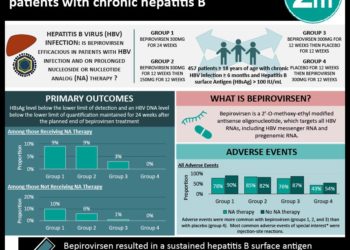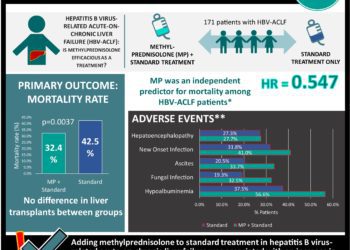Proper immunoprophylaxis lowers Hepatitis B in infants
1. One percent of all infants born to Hepatitis B (HepB) positive mothers developed the infection when treated at a Perinatal HepB Prevention Program.
2. Infants who had not completed the recommended vaccine prophylaxis, or those born to mothers with high viral disease loads, were at a greater risk of developing the infection.
Evidence Rating Level: 2 (Good)
Study Rundown: Approximately 25 000 infants are born every year to mothers infected with Hepatitis B (HepB) and are at risk of developing a chronic infection or premature death. The Center for Disease Control has established Perinatal HepB Prevention Programs (PHBPPs) throughout the country in order to ensure that infants receive HepB immunoprophylaxis, which is up to 95% effective in preventing disease transmission. Researchers of the current study described the perinatal HepB infection status of infants at 5 of these PHBPP sites. It was found that infants who developed HepB infection had younger mothers, Asian/Pacific Islander race, maternal HepB e-antigen positivity, greater maternal viral loads, and did not receive the recommended number of vaccine doses. Results may be limited as almost half of the infants were not tested for the infection, and only those who received postvaccination serologic testing were studied. However, these findings may encourage providers to strictly follow infant prophylaxis guidelines and administer antiviral therapy to mothers with high viral loads.
Click to read the study, published today in Pediatrics
Relevant Reading: The national perinatal hepatitis B prevention program
Study Author, Dr. Sarah Schillie, MD, MPH, MBA, talks to 2 Minute Medicine: Division of Viral Hepatitis, Centers for Disease Control and Prevention.
“Chronic hepatitis B develops in roughly 90% of infants who are infected perinatally, resulting in a 25% risk of premature death from liver failure or hepatocellular carcinoma. Although immunoprophylaxis (consisting of Hepatitis B vaccine and Hepatitis B Immune Globulin) prevents perinatal hepatitis B transmission in the majority of cases, approximately 1% of infants born to hepatitis B surface antigen-positive mothers develop infection. This paper reports that infants born to mothers who are younger or who have high viral loads have a greater possibility for infection, as are infants who receive fewer than 3 Hepatitis B vaccine doses. Antiviral therapy administered to mothers with high viral loads may be appropriate to further reduce perinatal hepatitis B transmission.”
In-Depth [retrospective cohort study]: Data from 17 951 mother-infant pairs were included for analysis. Researchers collected maternal demographic, laboratory testing, infant gestational age, birth weight, and immunoprophylactic management data from 5 PHBPP locations between January 2008 and March 2013. Prenatal infection was documented in 100 of 9252 (1.1%) infants. A total of 94.9% infants with treatment data available received both the HepB vaccine and the HepB immune globulin. A total of 1.1% of infants who received ≥ 3 vaccine doses developed the infection, compared to 6.7% of infants who received < 3 doses. Acquired HepB infection was significantly associated with the receipt of <3 HepB vaccine doses (p = .01), maternal age < 25 years (p = .01), Asian/Pacific Islander race (p < .01), non-English-speaking women (p = .02), women who were positive for the HepB e-antigen (p < 0.01), and women with a viral load ≥ 2000 IU/mL (p = 0.04). Timing of HepB vaccine birth dose (≤12 vs. >12 hours), timing of hepatitis B immune globulin administration (≤12 vs. >12 hours), gestational age, and birth weight were not significantly associated with the development of infection.
Image: PD
©2015 2 Minute Medicine, Inc. All rights reserved. No works may be reproduced without expressed written consent from 2 Minute Medicine, Inc. Inquire about licensing here. No article should be construed as medical advice and is not intended as such by the authors or by 2 Minute Medicine, Inc.







